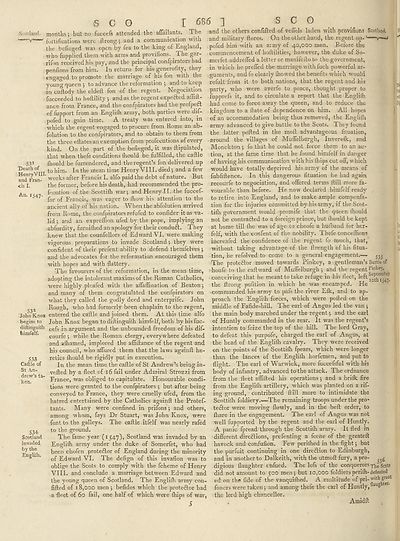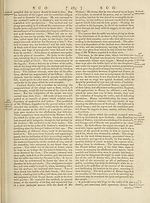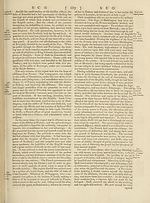Encyclopaedia Britannica, or, a Dictionary of arts, sciences, and miscellaneous literature : enlarged and improved. Illustrated with nearly six hundred engravings > Volume 18, RHI-SCR
(724) Page 686
Download files
Complete book:
Individual page:
Thumbnail gallery: Grid view | List view

SCO [
Scotland, niontlis} but no fuccefs attended the affailants.
531 ,
Death of
<is I.
An. 1547.
fortifications were ftrong •, and a communication with
the befieged was open by fea to the king ot England,
who fupplied them with arms and provilions. . I he gar-
rifon received his pay, and the principal confpirators had
penfions from him. In return for his generofity, they
engaged to promote the marriage of his fon with the
young queen \ to advance the reformation j and to K.eep
in cuftody the eldeft fon of the regent. Negociation
fucceeded to hoftility ; and as the regent expe&ed affift-
ance from France, and the confpirators had the profpedl
of fupport from an Englilh army, both parties were dif-
pofed to gain time. A treaty was entered into, in
which the regent engaged to procure from Rome an ab-
folution to the confpirators, and to obtain to them from
the three ellatesan exemption from profecutions of every
kind. On the part of the befieged, it was ilipulated,
that when thefe conditions fliould be fulfilled, the caftle
Ihould be furrendered, and the regent’s fon delivered up
to him. In the mean time Henry VIII. died; and a few
and'1 Fran- weeks after Francis I. alfo paid the debt of nature. But
the former, before his death, had recommended the pro-
fecution of the Scottifh war; and Henry II. the luccef-
for of Francis, was eager to (how his attention to the
ancient ally of his nation. When the abfolution arrived
from Rome, the confpirators refufed to confider it as va¬
lid ; and an expreflion ufed by the pope, implying an
abfurdity, furnilhed an apology for their conduct. They
knew that the counfellors of Edward VI. were making
vigorous preparations to invade Scotland; they were
confident of their prefent ability to defend themfelves ;
and the advocates for the reformation encouraged them
with hopes and with flattery.
The favourers of the reformation, in the mean time,
adopting the intolerant maxims of the Roman Catholics,
were highly pleafed with the aflaflination of Beaton;
and many of them congratulated the confpirators on
what they called the godly deed and enterprife. John
Rough, who had formerly been chaplain to the regent,
John Knox entered the caftle and joined them. At this time alfo
begins to John Knox began to diftinguiih himfelf, both by his fuc¬
cefs in argument and the unbounded freedom of his dif-
courfe; while the Roman clergy, everywhere defeated
and aftiamed, implored the afflftance of the regent and
his council, who allured them that the laws againfl: he¬
retics (hould be rigidly put in execution.
In the mean time the caftle of St Andrew’s being in-
vefted by a fleet of 16 fail under Admiral Strozzi from
France, was obliged to capitulate. Honourable condi¬
tions were granted to the confpirators ; but after being
conveyed to France, they were cruelly ufed, from the
hatred entertained by the Catholics againft the Protef-
tants. Many were confined in prifons; and others,
among whom, fays Dr Stuart, was John Knox, were
fent to the galleys. The caftle itfelf was nearly rafed
to the ground.
The fame year (1547)5 Scotland was invaded by an
Englifti army under the duke of Somerfet, who had
been chofen proteftor of England during the minority
of Edward VI. The defign of this invafion was to
oblige the Scots to comply with the fcheme of Henry
VIII. and conclude a marriage between Edward and
the young queen of Scotland. The English army con-
lifted of 18,000 men; befides which the protedftor had
a fleet of 60 fail, one half of which were (hips of war,
S
diftinguifh
tiimfelf.
S33
Caftle of
St An¬
drew’s ta¬
ken.
534
Scotland
invaded
by the
Englilh.
686 ] SCO
The and the others confifted of veflels laden with provifions Scotland,
and military ftores. On the other hand, the regent op-v—y—
pofed him with an army of 40,000 men. Before the
commencement of hoftilities, however, the duke of So¬
merfet addrefled a letter or manifefto to the government,
in which he prefled the marriage with luch powerful ar¬
guments, and fo clearly {bowed the benefits which would
refult from it to both nations, that the regent and his
party, who were averfe to peace, thought proper to
fupprefs it, and to circulate a report that the Englifti.
had come to force away the queen, and to reduce the
kingdom to a ftate of dependence on him. All hopes
of an accommodation being thus removed, the Englifti
army advanced to give battle to the Scots. They found
the latter polled in the moft advantageous fituation,
around the villages of Muffelburgh, Inverelk, and
Monckton; fo that he could not force them to an ac¬
tion, at the fame time that he found himfelf in danger
of having his communication with his (hips cut off, which
would have totally deprived his army of the means of
fubfiftence. In this dangerous lituation he had again
recourfe to negociation, and offered terms ftill more fa¬
vourable than before. He now declared himfelf ready
to retire into England, and to make ample compenfa-
tion for the injuries committed by his army, if the Scot-
tifli government would promife that the queen {hould
not be contracted to a foreign prince, but fliould be kept
at home till Ihe was of age to choofe a hufband for her-
felf, with the confent of the nobility. Thefe conceflions
increafed the confidence of the regent fo much, that,
without taking advantage of the ftrength of his fitua¬
tion, he refolved to come to a general engagement.— 535
The proteftor moved towards Pinkey, a gentleman’s Battle of
1 houfe to the cart ward of Muffelburgh ; and the regent ^inke>'>
conceiving that he meant to take refuge in his fleet, left
the ftrong pofition in which he was encamped. He
commanded his army to pafs the river Elk, and to ap¬
proach the Englidi forces, which were polled on the
middle of Fafide-hill. The earl of Angus led the van ;
the main body marched under the regent ; and the earl
of Huntly commanded in the rear. It was the regent’s
intention to feize the top of the hill, ffhe lord Gray,
to defeat this purpofe, charged the earl of Angus, at
the head of the Englilh cavalry. They were received
on the points of the Scottilh fpears, which were longer
than the lances of the Englilh horfemen, and put to
flight. The earl of Warwick, more fuccefsful with his
body of infantry, advanced to the attack. The ordnance
from the fleet aflifted his operations ; and a brilk fire
from the Englilh artillery, which was planted on a rif-
ing ground, - contributed ftill more to intimidate the
Scottifti foldiery.—The remaining troops under the pro*
teftor were moving flowly, and in the bell order, to
fhare in the engagement. The earl of Angus was not
well fupported by the regent and the earl of Huntly.
A panic fpread through the Scottilh army. It fled in
different diredlions, prefenting a fcene of the greateft
havock and confufion. Few perilhed in the fight; but
the purfuit continuing in one diredlion to Edinburgh,
and in another to Dalkeith, with the utmoft fury, a pro- ^
digious {laughter enfued. The lofs of the conquerors-rhe scots
did not amount to 500 men; but 10,000 foldiersperilh-defeated
ed on the fide of the vanquifhed. A multitude of pri-with great
foners were taken; and among thele the earl of Huntly, ^
the lord high chancellor.
Amidft
Scotland, niontlis} but no fuccefs attended the affailants.
531 ,
Death of
<is I.
An. 1547.
fortifications were ftrong •, and a communication with
the befieged was open by fea to the king ot England,
who fupplied them with arms and provilions. . I he gar-
rifon received his pay, and the principal confpirators had
penfions from him. In return for his generofity, they
engaged to promote the marriage of his fon with the
young queen \ to advance the reformation j and to K.eep
in cuftody the eldeft fon of the regent. Negociation
fucceeded to hoftility ; and as the regent expe&ed affift-
ance from France, and the confpirators had the profpedl
of fupport from an Englilh army, both parties were dif-
pofed to gain time. A treaty was entered into, in
which the regent engaged to procure from Rome an ab-
folution to the confpirators, and to obtain to them from
the three ellatesan exemption from profecutions of every
kind. On the part of the befieged, it was ilipulated,
that when thefe conditions fliould be fulfilled, the caftle
Ihould be furrendered, and the regent’s fon delivered up
to him. In the mean time Henry VIII. died; and a few
and'1 Fran- weeks after Francis I. alfo paid the debt of nature. But
the former, before his death, had recommended the pro-
fecution of the Scottifh war; and Henry II. the luccef-
for of Francis, was eager to (how his attention to the
ancient ally of his nation. When the abfolution arrived
from Rome, the confpirators refufed to confider it as va¬
lid ; and an expreflion ufed by the pope, implying an
abfurdity, furnilhed an apology for their conduct. They
knew that the counfellors of Edward VI. were making
vigorous preparations to invade Scotland; they were
confident of their prefent ability to defend themfelves ;
and the advocates for the reformation encouraged them
with hopes and with flattery.
The favourers of the reformation, in the mean time,
adopting the intolerant maxims of the Roman Catholics,
were highly pleafed with the aflaflination of Beaton;
and many of them congratulated the confpirators on
what they called the godly deed and enterprife. John
Rough, who had formerly been chaplain to the regent,
John Knox entered the caftle and joined them. At this time alfo
begins to John Knox began to diftinguiih himfelf, both by his fuc¬
cefs in argument and the unbounded freedom of his dif-
courfe; while the Roman clergy, everywhere defeated
and aftiamed, implored the afflftance of the regent and
his council, who allured them that the laws againfl: he¬
retics (hould be rigidly put in execution.
In the mean time the caftle of St Andrew’s being in-
vefted by a fleet of 16 fail under Admiral Strozzi from
France, was obliged to capitulate. Honourable condi¬
tions were granted to the confpirators ; but after being
conveyed to France, they were cruelly ufed, from the
hatred entertained by the Catholics againft the Protef-
tants. Many were confined in prifons; and others,
among whom, fays Dr Stuart, was John Knox, were
fent to the galleys. The caftle itfelf was nearly rafed
to the ground.
The fame year (1547)5 Scotland was invaded by an
Englifti army under the duke of Somerfet, who had
been chofen proteftor of England during the minority
of Edward VI. The defign of this invafion was to
oblige the Scots to comply with the fcheme of Henry
VIII. and conclude a marriage between Edward and
the young queen of Scotland. The English army con-
lifted of 18,000 men; befides which the protedftor had
a fleet of 60 fail, one half of which were (hips of war,
S
diftinguifh
tiimfelf.
S33
Caftle of
St An¬
drew’s ta¬
ken.
534
Scotland
invaded
by the
Englilh.
686 ] SCO
The and the others confifted of veflels laden with provifions Scotland,
and military ftores. On the other hand, the regent op-v—y—
pofed him with an army of 40,000 men. Before the
commencement of hoftilities, however, the duke of So¬
merfet addrefled a letter or manifefto to the government,
in which he prefled the marriage with luch powerful ar¬
guments, and fo clearly {bowed the benefits which would
refult from it to both nations, that the regent and his
party, who were averfe to peace, thought proper to
fupprefs it, and to circulate a report that the Englifti.
had come to force away the queen, and to reduce the
kingdom to a ftate of dependence on him. All hopes
of an accommodation being thus removed, the Englifti
army advanced to give battle to the Scots. They found
the latter polled in the moft advantageous fituation,
around the villages of Muffelburgh, Inverelk, and
Monckton; fo that he could not force them to an ac¬
tion, at the fame time that he found himfelf in danger
of having his communication with his (hips cut off, which
would have totally deprived his army of the means of
fubfiftence. In this dangerous lituation he had again
recourfe to negociation, and offered terms ftill more fa¬
vourable than before. He now declared himfelf ready
to retire into England, and to make ample compenfa-
tion for the injuries committed by his army, if the Scot-
tifli government would promife that the queen {hould
not be contracted to a foreign prince, but fliould be kept
at home till Ihe was of age to choofe a hufband for her-
felf, with the confent of the nobility. Thefe conceflions
increafed the confidence of the regent fo much, that,
without taking advantage of the ftrength of his fitua¬
tion, he refolved to come to a general engagement.— 535
The proteftor moved towards Pinkey, a gentleman’s Battle of
1 houfe to the cart ward of Muffelburgh ; and the regent ^inke>'>
conceiving that he meant to take refuge in his fleet, left
the ftrong pofition in which he was encamped. He
commanded his army to pafs the river Elk, and to ap¬
proach the Englidi forces, which were polled on the
middle of Fafide-hill. The earl of Angus led the van ;
the main body marched under the regent ; and the earl
of Huntly commanded in the rear. It was the regent’s
intention to feize the top of the hill, ffhe lord Gray,
to defeat this purpofe, charged the earl of Angus, at
the head of the Englilh cavalry. They were received
on the points of the Scottilh fpears, which were longer
than the lances of the Englilh horfemen, and put to
flight. The earl of Warwick, more fuccefsful with his
body of infantry, advanced to the attack. The ordnance
from the fleet aflifted his operations ; and a brilk fire
from the Englilh artillery, which was planted on a rif-
ing ground, - contributed ftill more to intimidate the
Scottifti foldiery.—The remaining troops under the pro*
teftor were moving flowly, and in the bell order, to
fhare in the engagement. The earl of Angus was not
well fupported by the regent and the earl of Huntly.
A panic fpread through the Scottilh army. It fled in
different diredlions, prefenting a fcene of the greateft
havock and confufion. Few perilhed in the fight; but
the purfuit continuing in one diredlion to Edinburgh,
and in another to Dalkeith, with the utmoft fury, a pro- ^
digious {laughter enfued. The lofs of the conquerors-rhe scots
did not amount to 500 men; but 10,000 foldiersperilh-defeated
ed on the fide of the vanquifhed. A multitude of pri-with great
foners were taken; and among thele the earl of Huntly, ^
the lord high chancellor.
Amidft
Set display mode to:
![]() Universal Viewer |
Universal Viewer | ![]() Mirador |
Large image | Transcription
Mirador |
Large image | Transcription
Images and transcriptions on this page, including medium image downloads, may be used under the Creative Commons Attribution 4.0 International Licence unless otherwise stated. ![]()
| Permanent URL | https://digital.nls.uk/193028119 |
|---|
| Attribution and copyright: |
|
|---|
| Description | Ten editions of 'Encyclopaedia Britannica', issued from 1768-1903, in 231 volumes. Originally issued in 100 weekly parts (3 volumes) between 1768 and 1771 by publishers: Colin Macfarquhar and Andrew Bell (Edinburgh); editor: William Smellie: engraver: Andrew Bell. Expanded editions in the 19th century featured more volumes and contributions from leading experts in their fields. Managed and published in Edinburgh up to the 9th edition (25 volumes, from 1875-1889); the 10th edition (1902-1903) re-issued the 9th edition, with 11 supplementary volumes. |
|---|---|
| Additional NLS resources: |
|

